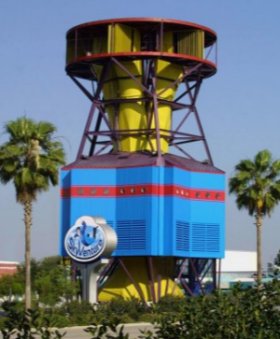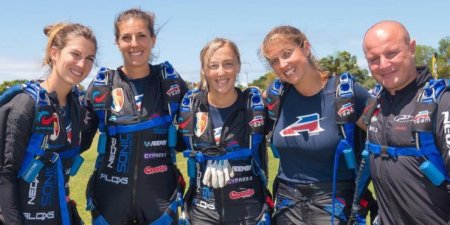
National
Skydiving
League
226 Pecan Street
Deland FL 32724
tel: (386) 801-0804
© 2003 - 2025
All Rights Reserved


226 Pecan Street
Deland FL 32724
tel: (386) 801-0804
© 2003 - 2025
All Rights Reserved


If you have a yes for each of the questions, then please forward your experiences and comments to Blue Skies Mag, or directly to the NSL headquarters at .
All right, let's start at the beginning. Indoor training became a part of the sport long ago. In fact, it was in 1998 when the SkyVenture Orlando 12-foot wind tunnel opened its doors and 4-way teams from all over the planet traveled to Florida for indoor practice. I remember the days when the tunnel was running for several months without ever being shut down, except for quick maintenance. Yes, teams booked flying time at all 24 hours of the day.
It still took several years until the first 4-way meets were organized by indoor entrepreneurs. Then came the first larger flying chambers and it was no surprise that the World Challenge in Bedford, UK, and the Paraclete XP Championship in Raeford, U.S., became the most popular indoor competitions. Both had 16-foot flying chambers.

 Back to the opening questions and let's ask the same tall 4-way fliers another one: Have you ever flown in one of the wind tunnels with a 16-foot flying chamber? If your answer is another yes, then please tell us also the difference between your 14- and 16-foot experiences.
Back to the opening questions and let's ask the same tall 4-way fliers another one: Have you ever flown in one of the wind tunnels with a 16-foot flying chamber? If your answer is another yes, then please tell us also the difference between your 14- and 16-foot experiences.
I myself do not reach the 6 feet or the 180 centimeters in height. However, I can tell you that I am not using my knee and elbow pads when I am flying in a 16-foot chamber. In other words, even as a shorter guy, I am still protecting my poor old body when I fly in any smaller chamber.
It's OK and a lot better when I am sharing the 12 or 14 available feet in diameter with other small people. In fact, it makes me so happy when I know that I am going to an event where I have a lineup with short people, even better when they are also as light as I am. Yes, I am selfish. But you know what? It rarely happens, as I like to fly with all people, which makes me load up with weights and put on the elbow and knee pads.
OK, it's a long opening statement, and I will try to get to the point now. The days of SkyVenture Orlando are long gone, indoor meets are taking place left and right and almost more often than outdoor meets. Finally, even the world's sanctioning organization of Formation Skydiving competition, the International Parachuting Commission (IPC) of the World Air Sports Federation (Federation Aeronautique Iinternationale - FAI), entered the indoor competition world by scheduling their own indoor world meets and world cups since 2014.
It was an interesting start, followed by years of interesting events. I love 4-way competition, so you can imagine I was thrilled to see more events where I could watch more world-class competition, even though the teams had already been competing in Bedford and at Paraclete for years, plus at an ever-growing number of other events.

FAI/IPC rather decided at their entry time into the indoor competition world that there will be a limited dive pool for the 4-way teams. Two blocks (1 and 13) were excluded when it was time for the competition draw. The teams still practiced the techniques for both blocks in all flying chambers, as they would be using them at outdoor competitions anyway, including FAI/IPC world meets and world cups.
FAI/IPC still wanted to use all numbers and letters at indoor and outdoor events both. So, their solution was to change the two blocks to fit them into the 14-foot flying chambers, as well. I have bitched about this earlier in Blue Skies Mag ("Slippery Road", issue #99). I did not like the idea that the outdoor dive pool became a victim of the indoor situation.
Anyhow, both dive pools are identical now at FAI/IPC indoor and outdoor events, and that's fine with me. What has not been fixed yet, or even considered, is the fact that small people like me have it much easier in a 14-foot flying chamber than members of the German national 4-way team do. I was not surprised that Airbus shied away from indoor competition for a long time. Eventually, they were so brave to attend their first indoor meet last year in a 14-foot flying chamber and they even won.
FSZ Saar Airbus at the German Indoor Nationals 2018 in Bottrop - French Weembi Girls at the FAI Indoor World Meet 2017 in Montreal

What I am trying to say is that I don't see a reason why FAI/IPC could not host all their world meets and world cups in 16-foot flying chambers. There are more than enough around by now. It would still be more difficult for the giants in the sport, compared to the small people, and they would have to wear their elbow and knee pads even in the larger 16-foot chambers. However, it would be much easier and fairer, with equal performance conditions for everybody.
 I cannot say what's in the way of doing this. All I know is that I am glad to see that this year's FAI Indoor World Meet takes place in the 16-foot flying chamber at Weembi Lille. Too sad that Airbus is probably not going to make it. There is a stronger indoor team now. They are all shorter and lighter, and the qualification in Germany takes place in a 14-foot chamber. My money is on the new team ...
I cannot say what's in the way of doing this. All I know is that I am glad to see that this year's FAI Indoor World Meet takes place in the 16-foot flying chamber at Weembi Lille. Too sad that Airbus is probably not going to make it. There is a stronger indoor team now. They are all shorter and lighter, and the qualification in Germany takes place in a 14-foot chamber. My money is on the new team ...
Fortunately, we don't have the same problem in outdoor competition. The skies are unlimited, and even a 4-way team of professional basketball players would have no troubles in freefall. However, they would still face the challenge of linked exits from jump planes with small doors. Well, I will save this for another day...